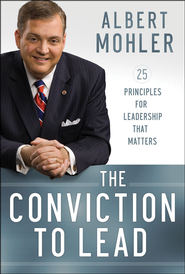by David Gunner Gundersen, Director of Student Life
The Conviction to Lead by Albert Mohler (Bethany House, 2012) is his legacy in the form of principles. Mohler does not aim to join the conversation about leadership but to change it (15). He is calling not for adjustments in managerial technique but a paradigm shift in the way we think about leadership.
Mohler surveys leadership trends from the 1950s onward and highlights the recent frenzy over leadership. He founds his book upon one major contemporary observation: “The evangelical Christian world is increasingly divided between groups we might call the Believers and the Leaders” (19). The Believers hold deep beliefs and passionate convictions, but they are suspicious, unskilled, or ignorant about leading. The Leaders are energized about leadership, skilled to lead, and passionate about change, but they are often driven by pragmatic strategies and are not often leading in a clear and convictional direction.
Mohler’s double-barreled aim is to convince Believers to lead and to fuel Leaders with conviction. The remaining chapters take aim at this twofold goal. Three strengths in particular stand out.
Clarity
The Conviction to Lead is infused with the clarity of a manifesto. The drive toward convictional leadership maintains force throughout the book and never lacks in thrust. His thesis is clear and his aim unswerving. There is no question that this book is about conviction: developing conviction, strengthening conviction, communicating conviction, stewarding conviction.
The vocabulary is simple yet graceful, bearing the true voice of a convictional leader. Mohler never chooses elegance over clarity. The profundity comes not in the complexity of his principles but in the clarion call for conviction cutting through the contemporary haze of uncertainty and relativism. In a world reeling in the stupor of what Derrida called postmodernism’s “incredulity toward metanarratives,” it’s invigorating to see someone plant a flag and plant it deep.
Power
The Conviction to Lead is a powerful book. Early on I was struck by the power of individual sentences, not only their ideas but their force. There are no unnecessary words, no wandering interludes, no verbal garnish. Clearly there is a point to be made, and it is made gracefully but without theatrics.
As I was writing one of the paragraphs above, I was going to slip in a parenthetical comment. As I edited my sentence to end with a declarative tone rather than a parenthesis, it occurred to me that The Conviction to Lead bears few parentheses. A quick sampling of the pages confirms my gut feeling: there are virtually no parenthetical explanations or caveats. This book stays on point, which gives it power.
Declarative communication has a powerful psychological effect. The listener must be inspired or enraged, but cannot be indifferent. Mohler, through both his instruction and his example, urges us not to put a finger in the wind but to plant a flag in the ground.
Conviction
Ultimately, the burden of the book is to fuel the fires of conviction (in Leaders) and to channel the torrent of belief (in Believers). This double burden weighs heavily throughout the book. The book is full of practical tips and advice on topics ranging from social media to reading priorities to time management to leadership succession. But each topic is addressed through the igniting lens of conviction. We use social media to spread and embed conviction. We read to fuel and refine conviction. We aim to use our time well and wisely because we want to maximize our convictions. We think about succession because we want our convictions to burn brightly long after we’re gone. Indeed, “The leadership that matters most is convictional — deeply convictional” (21).
In many ways, The Conviction to Lead is to leadership what John Piper’s Brothers, We Are Not Professionals is to the pastorate. Here is a principled man calling for principled leadership. I heartily commend this manifesto to all who want to lead with conviction.
<> <> <> <> <> <> <> <> <> <>
(Adapted from original post at Raw Christianity)




